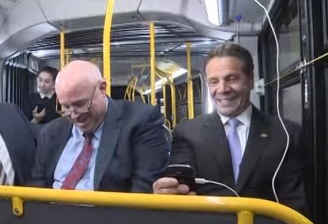Construction Industry Adds Muscle to Fight Against Albany Transit Raids

An erstwhile ally is getting back into the ring to fight for transit riders.
Traditionally, the politically powerful construction industry has focused its attention on keeping the MTA’s capital program funded. Contractors and the building trades unions depend on the MTA’s maintenance and expansion projects for business, but haven’t been so concerned if an unbalanced operating budget ended in fare hikes or service cuts.
Now, however, the MTA’s bottom line has been so battered by Albany’s attacks that one top construction industry group has begun to advocate for stabilizing the operating budget. Unless Albany makes the operating budget right, they say, it’ll take down the capital program with it.
Writes the New York Building Congress in its newsletter:
The State’s financial gimmickry has forced capital priorities to compete for the same resources as the MTA operating budget. Despite a yawing capital funding hole, the MTA recently borrowed $500 million from its “Capital Financing Fund” to pay operating expenses. The MTA claims it will repay this money beginning in 2012, a year it already anticipates a $207 million operating deficit. However, if it does not, the MTA reports that it “will be unable to meet obligated capital program expenditures, further increasing the $10 billion funding gap.”
In other words, the wall between capital and operating dollars is increasingly porous. If Albany continues to raid the operating budget, the capital program will be short and the transit system will return to 70s-style disrepair. If the $10 billion hole in the capital plan isn’t filled, the MTA will have to take on still more debt to finish necessary work, debt which straphangers will have to pay off one MetroCard swipe at a time.
As we reported earlier today, it seems that tomorrow’s executive budget is likely to continue raiding MTA dedicated funds, though without instigating further fare hikes or budget cuts. The Building Congress decries those raids, saying that they are “choking the system most essential to the economy’s recovery and long-term health.”
But stopping the raids of dedicated revenue streams won’t be enough to put the MTA’s finances in order. The Building Congress also lays out a string of additional ways the state starves transit riders riders that need to be stopped:
- Under the “18b program,” the state is required to provide certain matching funds to the MTA each year. But since 1996, the state has counted dedicated transit taxes as its contribution, an accounting trick which lets them weasel out of actually paying. According to the Building Congress’s conservative estimate, that costs the MTA $175 million each year.
- Sales taxes are always calculated as a percentage of a price. But in 2006, the state decided that the sales tax on gasoline would be capped. At 2006 gas prices, that cost the state $225 million per year, but the amount of foregone revenue rises every time the price of gas does.
- The state once directly contributed $1.5 billion to the MTA’s five-year capital program. Mario Cuomo cut that to zero, where it is today.
The Building Congress also recommends the the state stop all efforts to repeal the payroll mobility tax, citing the MTA’s “unprecedented financial crisis,” and urges that congestion pricing or some other new revenue stream be added on top of it, with the revenues in a transportation lockbox. They also call for continued cost cutting by the MTA and the creation of a regular biannual schedule for fare and toll increases.
The builders’ decision to fight for all these changes is a welcome infusion of political muscle, but it’s also a sign of just how tenuous the MTA’s fiscal situation is. At this point, everyone’s in it together.
